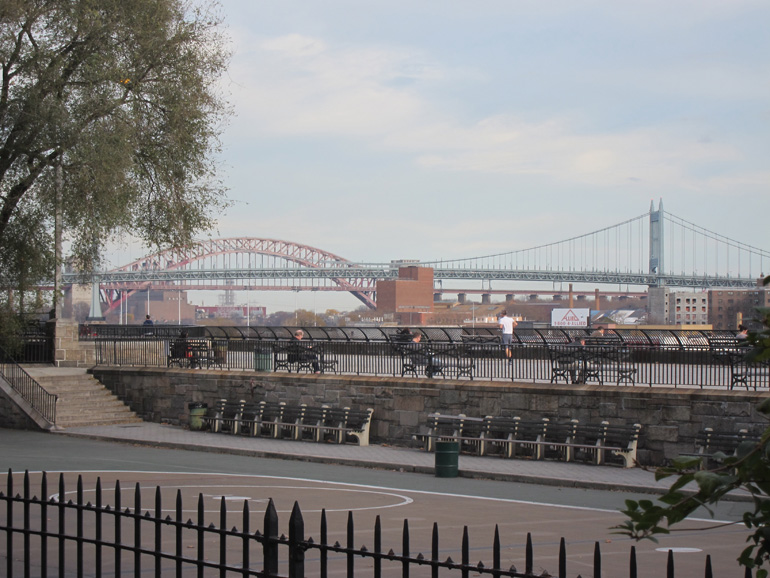Gotham Diary:
Running Down
7 December 2011
Wednesday, December 7th, 2011
Good clocks don’t run down, ticking ever more slowly until their hands stop moving. They either tell the time or they stop. So I’m much more like a bad clock right now, a poorly designed contraption. I am definitely ticking ever more slowly. Every day is a little bit harder to get through than the one before. But only a little. It’s not so bad. It’s just perceptibly worse than normal. For which I’m very grateful — both for the normal, which wouldn’t be normal at all if it weren’t for the Remicade that is going to bring me right back to it next Tuesday, and for the marginal nature of the deterioration. I’m never actually sick. Just “tired.” And the thing that tires me out the most is making plans. The nice thing about today is that I don’t think that I’m going to have to make any plans. My plans are in place. Certainty is its own source of energy.
***
As we walked from the Biltmore to the Brasserie last night, we talked about great performances that we had seen on and off Broadway over the years. Well, we didn’t talk about them; we enumerated them. When I’d said, of the play that we’d just seen, David Ives’s Venus in Fur, that it was “one of those big nights that you put in your Broadway scrapbook,” I was thinking that, maybe, there were four or five other performances to compare with Nina Arianda’s, but by the time dinner was over, we were well past the thirty-mark — we’ve seen Stockard Channing alone on three extremely memorable occasions, in Hapgood, The Lion in Winter, and The Little Foxes; and mentioning Hapgood reminds us of her costar, David Strathairn, in Stranger, with Kyra Sedgwick; and on it goes — and we never did remember Jefferson Mays in I Am My Own Wife. The fact is, we’ve seen a lot of great theatre. We haven’t seen everything; from a true theatregoer’s perspective, we haven’t even seen very much. Our scrapbook doesn’t have to be all that voluminous. But there will definitely be a page for Nina Arianda’s Vanda. Let me say right away that Hugh Dancy, the other member of the cast (he plays a young man called Thomas), was superb as well: he carried Ms Arianda as beautifully as Nureyev carried Fonteyn. But Venus in Fur is about the goddess in the title.
Venus in Fur shimmers from shifting perspectives. There is of course the novel by Sacher-Masoch, that caused a perversion to be branded with the author’s name, and the title of which David Ives borrowed for his play. Somewhat more distant but vastly more resonant, there is Euripides’s terrifying Bacchae. In that play, a foolish king believes himself powerful enough to subdue what he takes to be a disorderl, ecstatic cult, and fails to recognize the presence of the god Dionysus. Dramatic irony is wound to the highest pitch as the god helps the king to disguise himself as one of the madwomen, headed by his own mother, who roam the outlying hills and whose excesses the king insists upon stopping. The disguise is foolish, because the god simply betrays the king to his antagonists; his mother is the first to attack him. What this has to do with Venus in Fur is the latter’s demonstration of the updated folly of a theatre director who believes that he can tame an ambitious actress.
You can see Vanda as an incarnation of Venus, as a goddess who has somehow descended upon a hapless and confused but also somewhat grandiose dramaturge. (The conceit of Thomas’s relation to the drama that he is trying to cast is intriguing, because, as the adapter of a novel who intends to direct a production of his adaptation, Thomas is nonetheless not the playwright.) You can imagine that the thunder and lightning that frame the show signal the presence of a dangerous divinity. Living in New York, however, it’s much easier to imagine Vanda as an intense striver determined to do anything to get a part, even if it means purloining a copy of the entire script, buying an assortment of surprisingly suitable props, and and stalking the director. Not to mention a willingness to deploy no fewer than three fatal instrumentalities. There is no real need to get all supernatural and stuff. But it’s fun to do so, because Venus in Fur is, at heart, a comedy about getting what you asked for.
Nina Arianda is very funny and very agile; she’s frankly acrobatic. But what sears her performance into the mind is her dangerousness. Even when she’s being A jolly ditz, as in the earlier part of Venus in Fur, she is clearly (dramatic irony!) not to be trusted. And when she slips from her late-stage Valley Girl like-lish into the husky, artistocratic tones of the baroness in Thomas’s adaptation, the effect is simultaneously hilarious and menacing. (Barbra Streisand and Nicole Kidman are the only other comediennes I can think of who are as agile at shifting registers faster than the blink of an eye.) But no matter how deeply her performance unsettles you, you walk out of the theatre on clouds, because you know that there are going to be at least three or four utterly memorable evenings ahead. Plays are going to be written for Nina Arianda.




















